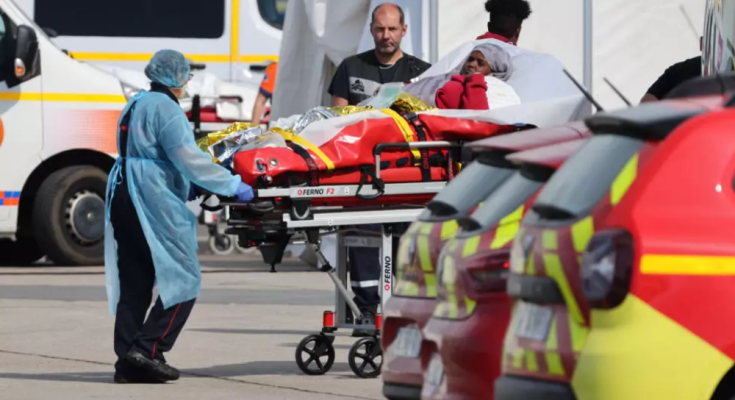‘I saw them die’: Survivors recount migrant boat capsizing in Channel
Calais (France) (AFP) – Biniam Semay was on a boat carrying dozens of migrants across the Channel from France to England when the fragile vessel ripped apart, leaving his younger sister and 11 others dead.
Issued on:

About one hundred people gathered on Wednesday evening at a candlelight vigil in the northern French city of Calais to pay tribute to the 12 migrants who died on Tuesday in the deadliest such disaster this year.
The 34-year-old Eritrean recounted the “horrific” moment he lost his 18-year-old sister, whom he said had a “whole future ahead of her”.
“In four or five minutes, it was completely destroyed and sank,” he said, describing the moment the boat capsized plunging dozens into the English Channel’s treacherous waters.
He grabbed his sister’s hand and tried to find something to hang on to but a wave pushed them apart.
“Then the rescue ship came, and when they rescued me, I saw my sister… and she was already dead.”
“Only God knows how I survived,” he said.
-‘Angry and upset’-
Tuesday’s death toll is the highest since November 2021 when 27 migrants lost their lives in the Channel, an incident that sparked tensions between France and Britain over who needed to do more to prevent such disasters.

The two countries have for years sought to stop the flow of migrants, who pay smugglers thousands of euros per head for the passage to England from France aboard small boats.
On Monday alone, 351 migrants crossed in small boats, with 21,615 making the journey this year, according to UK government statistics.
Earlier this summer British Prime Minister Keir Starmer and France’s President Emmanuel Macron pledged to strengthen “cooperation” in handling the surge in undocumented migrant numbers.
But for some activists at the vigil, like Feyrouz Lajili, those efforts are falling short with this year’s death toll at 25, up from 12 last year.
“We’re angry and upset, not least because we feel these deaths could have been prevented,” said Lajili, project coordinator for international NGO Doctors Without Borders.
Steve Smith, head of the Care4Calais charity agreed, saying investment in security measures was “not reducing crossings”.
“It is simply pushing people to take ever increasing risks to do so,” he said.
-‘I saw them die’-

Another survivor of Tuesday’s disaster said the first rescue boats to arrive on scene were too small to accommodate the 60 or so migrants in the water.
“There were a lot of girls and young boys, and I saw them die,” Amanuel from Eritrea, who did not provide his full name, told AFP.
He described struggling to hold on to what remained of the boat while others clung to him.
French authorities seek to stop migrants taking to the water but do not intervene once they are afloat except for rescue purposes, citing safety concerns.
All resources that could be mobilised on Tuesday were, said the French government’s junior minister for maritime affairs, Herve Berville.
But he added people need to know that “while this rescue operation is underway… it isn’t the only emergency at sea”.
One of the last to be rescued, Amanuel said he would not attempt the crossing again.
Others, like Muhammadullah, say they are not dissuaded by the risks.
Having fled Afghanistan to escape the Taliban, Muhammadullah, who also only gave one name, told AFP that he would have liked to stay in France but could not get the papers he needed to remain in the country.



